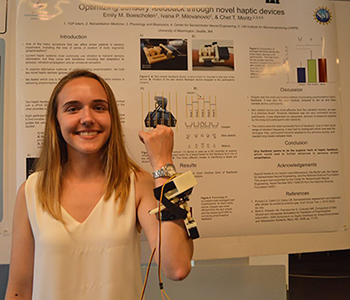Interning with the CNT

This summer, I was a member of the Center for Neurotechnology (CNT) Young Scholars Program (YSP). The program offers research experience in neural engineering as well as education in scientific skills. Topics such as neural ethics and scientific communication are also covered. I was lucky enough to be one of nine high school students selected to participate in this program. I worked in Dr. Chet Moritz’s lab at the University of Washington Medical Center along with two other high school students and two undergraduate students.
Every Tuesday morning, all of the summer interns had a weekly communication class lead by Dr. Lise Johnson. The classes focused on the skills needed to be successful in a scientific field. I found the classes to be very valuable because even though in my high school science classes we would write plenty of lab reports, I was never shown how those skills would translate into a real-world application. All of the work in this class was geared towards preparing for the research talk I would have to present at the end of the program.
We also attended study sessions led by our coordinator, Nona Clifton, where all of the high school students could meet, talk about what we learned, and clear up any questions that we had for class that morning. I was thankful for the support I was given in the study session, because a number of my classmates and fellows interns were students from prestigious schools, such as MIT. Working with Nona and my fellow YSP’s helped me keep up with the rigor of the classes and my research work within in the lab.
On Thursday mornings, we attended seminars on a variety of topics in the field of neural engineering such as industry, neuroethics, human and animal research, and impostor syndrome. Most of the topics I knew a little bit about from school, but it was extremely interesting to learn from experts in the neural engineering field. On top of these seminars, the CNT held a number of round table discussions, the highlight of which was the end-user round table. I was able to meet users of neural technology and learn how technology impacted their lives. From these discussions I could see how important the field of research is, as I was exposed to how much potential neural engineering holds in improving the lives of people with disabilities.
Prior to this summer I had minimal experience with neural engineering and engineering in general, which caused me to have a very steep learning curve. Luckily, my mentor, Ivana, was very supportive and urged me to learn AutoCAD. After watching YouTube tutorials for a week, I learned how to use AutoCAD and made two products that I am now very proud of. Working with Ivana showed me how beneficial it can be to work as a team. Both of us had different skills sets, but when we worked together we were able to accomplish more than we expected in less than nine weeks. In the short time that we had together, we were able to make two devices with AutoCAD, test what we made on nine people, and get significant data. I am very happy to have had such an amazing experience at the CNT this summer and I look forward to using all that I have learned in the future.